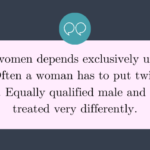What has been inherent from the beginning of our conscious is that women are primary family caretakers and should have the ambition of snagging an economically well-off, kind man for a husband. This ideology overshadows what women do in all aspects of life. It’s not different when it comes to health as well. As women are anchors of the family, it is but natural for them to prioritize their families’ health over their own.
India and China today have the highest diabetes burdens in the world. According to the World Health Organization (WHO), India has close to 62 million people living with the diseases and is projected to have close to 70 million diabetics by 2025. Keeping this in mind, when we say diabetes, we think men. Diabetes, at least in an Indian context, has seldom been spoken in terms of women. When it comes to diabetes, preventive measures and the correct time to seek help, women often approach the doctors very late.
According to a survey by The Economic Times, 85% of women agree that regular medical checkup is a necessity to prevent and control diabetes. And yet only 50% of the surveyed women have not had themselves examined for diabetes.
When it comes to handling their own diabetes problem, women often just consult friends and resort to whatever their friend has advised them to, which more often than not is relegated to exercise and yoga. While exercise and yoga are still good options, women have been noted saying that between work and handling the work at home, they do not have the time to spare. The three simple things that one can do to prevent or control diabetes are:
- Lifestyle change
- Dietary adjustments
- Exercise (walking, exercise, yoga)
For women, maintaining these three things proves to be a challenge and therefore, diabetes is ignored in the favor of family and work. The repercussions of this ignorance can lead to difficulty in conceiving, miscarriages, malformed babies, poor outcome in pregnancies. In the presence of gestational or pre-gestational diabetes, the child can be severely affected because the maternal sugar gets transferred to the fetus. According to the International Diabetes Federation (IDF), 10 out of one women are living with diabetes, many of whom do not have access to healthcare and lack awareness about the disease. Mostly, women end up going to the doctor only when complication arises. According to doctors, a diabetic female faces four times higher risk of developing heart ailments than men.
If blood sugar levels of any pregnant woman are high during pregnancy, her baby can be affected in the following ways –
- Macrosomia – baby born with a larger than average head
- Heavyweight baby
- Congenital anomalies at birth like cardiac defects
- Babies born to diabetic mothers are likely to have diabetes in future. Not only this, children born to women with gestational diabetes more likely to develop intellectual disabilities later in life.
- The sudden death of a baby before birth, i.e. stillbirth.
Inequitable access to resources prevents early diagnosis of the disease in women. The problem is not just awareness but also access to medication. Because of being restricted to the home and letting the man handle medication, women miss out on getting their medication. Especially in households where the money is tight, medicine is luxury and will come for the man before the woman, if ever. Restrictive gender norms affect women when there’s a clear difference in exposure, susceptibility and biases in the health system. What we need to encourage is equality when it comes to housework and to promote proper health-care options for women. Instead of substituting their health in the favor of their children and husband, women need to go for regular check-ups, understand the problems that arise with being diabetic and take proper prevention including control medication.





